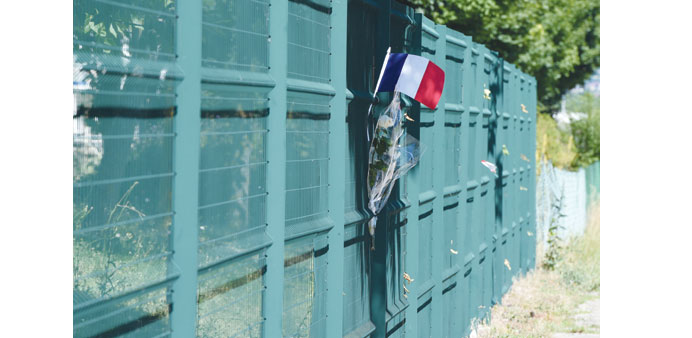AFP
Paris
A French flag and flowers are placed on the fence of the Air Products gas factory in Saint-Quentin-Fallavier near Lyon, where the head of the decapitated man was found in a suspected Islamist attack days earlier.
The gruesome “selfie” taken by a man who has confessed to beheading his boss during an attack on a gas factory in France was sent to Syria, sources close to the investigation said yesterday.
The news emerged as Yassin Salhi, 35, was being transferred from France’s second city of Lyon to Paris for questioning by specialised anti-terrorist police.
Examination of one of Salhi’s mobile phones revealed that he had taken a picture of himself with the severed head before his arrest and sent the image to a Canadian phone number.
Canadian authorities said yesterday that they were assisting the investigation.
The phone number belongs to a French national, known by his first name Sebastien-Younes, who has been in Syria since last year, the same source said, confirming media reports.
His last known location was the Islamic State stronghold of Raqqa.
Salhi confessed to the grisly crime earlier yesterday and has also given “details about the circumstances” surrounding the killing, according to sources close to the investigation.
He left the police headquarters in Lyon in a van escorted by nine unmarked cars en route to the capital.
The convoy stopped briefly at Salhi’s house to pick up his passport, where several masked officers bundled him into his apartment, covering his face with a white cloth and fitting him with a bulletproof vest.
Investigators discovered on Saturday that the married father-of-three had sent a photo of himself and the severed head via the WhatsApp messaging service to a number in Canada.
But officials warned that the Canadian number might be a relay number and the intended recipient could be anywhere in the world.
Hundreds of French citizens have left for Iraq or Syria to wage jihad and Prime Minister Manuel Valls said earlier yesterday that 1,800 people in France were “linked” in some way to the Islamist cause.
After several hours of silence, Salhi began to open up to investigators about the assault, which came six months after 17 were killed in Islamist attacks in Paris that began with the massacre at the satirical magazine Charlie Hebdo.
Authorities can hold him without charge for up to 96 hours.
His wife and sister, who were both taken into custody on Friday, have been released.
Salhi rammed his van into the US-owned Air Products factory near Lyon on Friday in what President Francois Hollande has said was a “terrorist” attack designed to blow up the whole building.
He was overpowered by a firefighter as he was trying to prise open a bottle of acetone in an apparent suicidal bid to destroy the factory.
Police then made the shocking discovery of the severed head of Salhi’s boss, 54-year-old Herve Cornara, tied to the gates of the factory near two flags on which were written the Muslim profession of faith.
Valls told French television yesterday that the world was engaged in a “war against terrorism”.
“We cannot lose this war because it’s fundamentally a war of civilisation. It’s our society, our civilisation that we are defending,” Valls told iTELE rolling news channel.
France is facing “a major terrorist threat” which needs to be fought “over the long term”, warned the prime minister.
It’s not a question of whether there will be another attack, but “when” and “where”, stressed Valls.
It also emerged yesterday that Salhi and Cornara may have quarrelled just two days before the killing.
According to sources close to the investigation, one of the company’s employees said that Salhi had dropped a crate of expensive materials, was reprimanded by his boss and voices were raised.
Friday’s attack came on a day of bloodshed on three continents that saw 38 people mown down on a Tunisian beach and 26 killed in a suicide attack in a Kuwait mosque.
The Islamic State extremist group has claimed responsibility for those two attacks but no group has said it carried out the French operation.
Sources close to the investigation said that Salhi was radicalised more than a decade ago after contact with Muslim convert Frederic Jean Salvi – known as “Ali” – who is suspected of preparing attacks in Indonesia with Al Qaeda militants.
An autopsy on the victim has proved inconclusive, with experts unable to determine whether he was killed before being beheaded or decapitated alive.
Nearly six months after the Charlie Hebdo massacre, the attack raised painful memories for France, which is still on high alert for potential repeats.
Around 200 people in the town of Saint-Quentin-Fallavier – where the attack took place – staged a minute’s silence in the victim’s honour followed by a rousing and spontaneous rendition of the French national anthem.
Like the Charlie Hebdo attackers and Islamist Mohamed Merah who gunned down soldiers and Jewish children in the southwest city of Toulouse in 2012, Salhi had been known to French security services for “radicalisation” but slipped through the net.
Interior Minister Bernard Cazeneuve said on Friday that Salhi had been investigated for links to radical Salafists in Lyon, but was not known to have participated in terrorist activities and did not have a criminal record.

